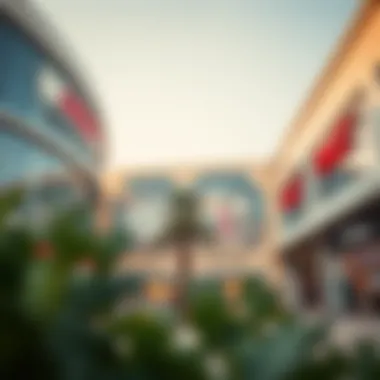Exploring the Markets of Fujairah: A Comprehensive Insight


Intro
Fujairah, one of the seven emirates that constitute the United Arab Emirates, is often overshadowed by the glitz and glamour of its neighboring cities like Dubai and Abu Dhabi. However, what it lacks in flashy skylines, it makes up for with a rich tapestry of culture, history, and vibrant markets. These markets have become a vital nerve center for commerce and are woven into the social fabric of the region. In this article, we’ll take a closer look at the unique market landscape of Fujairah, examining everything from its historical roots to the modern-day trends shaping its economic trajectory.
The markets here are not just places to buy and sell goods; they’re venues where tradition meets innovation. Each stall and aisle tells a story, and for many locals and expatriates alike, they represent a practical approach to day-to-day living. The vendors are often the keepers of age-old traditions, selling spices, textiles, and handicrafts that reflect the local heritage.
This exploration will highlight key insights into various aspects of Fujairah's markets, offering a detailed look at how they operate, the types of products available, and the impact of technology on shopping behaviors. By weaving together historical context with current trends, we aim to equip readers with the knowledge to navigate these markets effectively, whether you’re an investor, a homebuyer, a realtor, or simply someone eager to understand the pulse of Fujairah's commerce.
With that in mind, let’s dive into the heart of Fujairah's markets and explore the wealth of opportunities that await.
Prelims to Fujairah's Markets
Fujairah, the only emirate of the UAE located on the eastern coast, offers an eclectic mix of markets that hold more than just commodities. These markets are a window into the cultural soul of the region, reflecting its rich history and vibrant present.
Understanding the markets of Fujairah is crucial for anyone interested in the economic landscape of the UAE. They provide not just shopping opportunities, but also insights into local traditions, social interactions, and community dynamics. Moreover, they present a unique blend of the old and the new, showcasing traditional souks alongside contemporary shopping centers. This symbiosis provides both residents and visitors with a well-rounded shopping experience.
By exploring Fujairah's markets, investors, homebuyers, and expatriates can gauge consumer behaviour, spot emerging trends, and appreciate the local ethos that underpins commerce in the region. This foundation sets the stage for a deeper dive into the specifics of what makes Fujairah's markets truly unique.
Historical Overview
Fujairah's markets have a storied past, rooted in early trade practices and the region's strategic position along maritime trade routes. Long before the UAE’s unification in 1971, Fujairah was already carving its niche in the market landscape. The ancient inhabitants of the area engaged in trade with countries bordering the Indian Ocean, bringing spices and textiles that still echo in today’s market offerings.
Over centuries, various influences—from Portuguese explorers to Indian traders—have contributed to the evolution of local markets. This amalgamation of cultures is evident in the products available today, from exotic spices to intricate handicrafts.
The Significance of Fujairah
Fujairah is not just a dot on the map; it serves as a vital artery for trade not just within the UAE, but also connecting to international markets. Its geographical advantage as the closest emirate to the Arabian Sea allows for swift transportation, making it a focal point for business activities.
Furthermore, the markets play an essential role in sustaining local economies. They create employment, bolster entrepreneurial initiatives, and contribute to the cultural identity. Tourists and locals alike flock to Fujairah’s markets, not just for goods, but for the experience—where commerce meets community, and tradition meets modernity. As a result, the markets are indispensable to both the regional economy and the cultural fabric of Fujairah.
Types of Markets in Fujairah
The markets of Fujairah present a microcosm of the broader economic and cultural landscape of the United Arab Emirates. By analyzing the types of markets available, one can appreciate not just the diverse offerings but also the local customs, shopping behaviors, and lifestyle preferences of its citizens. Traditional souks, modern shopping centers, and farmers' markets each represent distinctive facets of Fujairah’s repertoire, demonstrating the blend of heritage and modernity that defines this region. Understanding these market types is crucial for investors, expatriates, and homebuyers seeking to tap into this vibrant sector.
Traditional Souks
Al-Fahidi Souk
Al-Fahidi Souk is a place where history meets commerce, showcasing the traditional essence of Fujairah's trading culture. Nestled in the heart of the city, its winding alleys and local stalls create an atmosphere that embodies the region's rich heritage. One of the key characteristics of Al-Fahidi Souk is its architectural style, which closely resembles the historical structures found throughout the UAE, providing visitors with a glimpse into the past while they shop.
This souk is known for its handcrafted goods, ranging from textiles to pottery, appealing to both locals and tourists. What makes it popular is not only the availability of unique items not found in malls but also the interaction with local artisans who offer a personalized shopping experience.
However, one must note that while Al-Fahidi is an enchanting spot for cultural immersion, the narrow pathways can become quite crowded during peak hours, which might deter some shoppers.
Spice Souk
The Spice Souk, a vibrant tapestry of colors and aromas, plays an indispensable role in Fujairah's market ecosystem. This market specializes in spices, herbs, and condiments from across the globe, making it a haven for culinary enthusiasts. A significant aspect of the Spice Souk is its commitment to preserving traditional trade practices, as many stalls are family-owned businesses that have operated for generations. This market stands out due to the sheer variety of spices available, from saffron to sumac, all sourced ethically.
Culinary tourism is increasingly drawn to this location, recognizing it as a place to not only shop but to learn about local culinary practices. On the downside, the lack of standardization in prices may lead to some haggling, which could put off non-local shoppers unfamiliar with this practice.
Modern Shopping Centers
Malls of Fujairah
Modern shopping centers in Fujairah, particularly the prominent malls, have emerged as sprawling complexes that cater to various consumer needs. These malls are essential in promoting consumerism while blending leisure and shopping. Among their key features is the extensive variety of international retail brands, restaurants, and entertainment options available under one roof. This has transformed them into social hubs for families and expatriates alike, making shopping a recreational activity rather than a chore.
Significantly contributing to the area's economy, these malls generate a substantial amount of employment while also attracting regional shoppers. Nonetheless, they can dilute the charm of traditional markets, as many locals opt for the convenience of modern shopping.
Retail Chains


Retail chains in Fujairah have become synonymous with reliability and efficiency. These establishments offer consumers a consistent shopping experience across numerous locations. One characteristic that sets them apart is their ability to provide diverse products at competitive prices. This factor is crucial for price-sensitive consumers and can enhance market accessibility, particularly for new residents and expatriates.
These chains often focus on a variety of products, from groceries to clothing, leading to greater choice for consumers. However, the impersonal nature of large chains may deter those seeking the personalized service typical of traditional markets.
Farmers' Markets
Organic Produce
Farmers' markets in Fujairah are gaining momentum as health-conscious consumers seek fresh and organic options. These markets connect local farmers with shoppers, promoting sustainable agricultural practices. The standout characteristic of organic produce markets is the freshness and quality of the products, often harvested within hours of selling.
This freshness not only supports local economies but also fosters a community spirit as residents engage directly with local producers. The increase in organic products aligns with global trends towards healthier living, making these markets appealing to a younger demographic. However, limited availability during certain seasons might restrict options compared to larger stores.
Local Goods
Local goods markets celebrate Fujairah’s rich agricultural heritage, offering everything from handmade crafts to traditional foods. This focus on local produce allows consumers to experience and savor the flavors of the region directly. A notable characteristic of these markets is the emphasis on supporting local businesses and artisans, fostering a sense of community while promoting sustainability.
The appeal lies in unique, locally produced items that reflect culture and tradition, making it an attractive choice for tourists and locals. Still, the limited scale of local goods markets might pose challenges for those seeking a wider range of more commercial products.
By examining the various types of markets in Fujairah, it becomes evident that they each serve unique roles, contributing to the cultural, social, and economic fabric of the region. Understanding these differences can provide valuable insights for those hoping to engage with the markets, be they residents or potential investors.
Consumer Behavior in Fujairah Markets
Understanding consumer behavior within the markets of Fujairah is crucial for anyone looking to engage in trade or invest in this region. This topic encompasses the motivations and preferences that shape purchasing decisions, providing insights that could drive successful marketing strategies. The nature of consumer behavior often reflects cultural, social, and economic factors specific to Fujairah, making it an essential aspect for stakeholders in real estate, retail, and hospitality sectors.
Shopping Preferences
Shopping preferences among consumers in Fujairah are influenced by a blend of tradition and modernity. Residents and tourists alike gravitate towards a variety of shopping venues. For instance, many locals still enjoy the tactile experience of bargaining at traditional souks, like the Al-Fahidi Souk. There, one can find textiles, jewelry, and spices, appealing to those who appreciate both cultural heritage and the thrill of negotiation.
On the flip side, modern shopping centers, such as Fujairah Mall and Safeer Mall, have embarked on a journey to cater to a different clientele. Shoppers in these venues often seek a one-stop solution for their needs—enjoying leisure activities, dining, and retail in a single visit. The trend is skewed toward convenience, with many preferring to browse online or utilize mobile applications for purchases, thanks to the growing reliance on technology to expedite the shopping process.
- Key Shopping Preferences:
- Emphasis on local products and organic goods at farmers’ markets.
- Digital engagement through e-commerce platforms.
- Hybrid shopping experiences that combine online and offline elements.
Cultural Influences on Buying Habits
Cultural nuances play a decisive role in shaping buying habits in Fujairah. The heritage of the Emirate is interwoven with Islamic values, which impact consumer choices. Many families make purchases for communal or family gatherings, often opting for larger quantities and brands that are perceived as superior. This inclination not only supports local businesses but also sustains traditional practices.
Moreover, the presence of various expatriate communities diversifies the market landscape. Different cultural backgrounds introduce unique preferences and demands for various products, from gourmet food items to traditional clothing.
Understanding these cultural influences can offer investors a competitive edge. For example:
- Local Insights:
- The importance of Ramadan and Eid celebrations on sales of specific goods.
- Expat festivals impacting the demand for international products.
"Truly successful market strategies acknowledge the depth and intricacies of consumer preferences driven by culture and community values."
Concluding Thoughts
Consumer behavior in Fujairah's markets is a vivid tableau of evolving preferences and cultural traditions. Recognizing these dynamics provides essential leverage for businesses and investors aiming to thrive in Fujairah's commercial landscape. Navigating these complexities aids in formulating strategies that resonate with the community and cater to the unique market demands.
Impact of Digital Transformation on Markets
In today's fast-paced world, the influence of digital transformation on markets cannot be overstated. As Fujairah’s marketplace evolves, the integration of new technologies is not just a passing trend; it's reshaping the very fabric of commerce in the region. From enhancing consumer experiences to improving operational efficiencies, digital transformation is a vital element in keeping Fujairah’s markets competitive and attractive. The landscape is changing, and understanding these shifts is crucial for investors, homebuyers, realtors, expatriates, and developers.
E-commerce Trends
E-commerce is on the rise, and it’s got its feet firmly planted in Fujairah. The ease of online shopping means that local businesses can reach customers far beyond their immediate geographic areas, broadening their markets while also increasing competition. Some individuals might still prefer the feel of traditional shopping, but data suggests a growing comfort among consumers to make purchases online, especially since the pandemic.


With businesses introducing websites and mobile apps, shoppers can browse everything from spices to luxury goods with a few taps on their devices. Companies are also leveraging various payment systems, making transactions seamless. For instance, using platforms like PayPal, and direct bank integrations offer security and convenience, which buyers appreciate.
- Consumers are more likely to shop online for:
- Exclusive offers
- Unique products not seen in stores
- Time-saving options, especially for busy professionals
E-commerce isn’t just a trend; it's quickly becoming a necessity. As businesses in Fujairah adapt to this digital landscape, they must stay aware of trends such as mobile optimization, personalized marketing, and data analytics to ensure they don’t fall behind in the game.
Social Media Marketing
Social media isn't just a place for fun and games; it's also where pertinent business happens. Fujairah's markets are beginning to realize the power of social platforms like Facebook and Instagram. Utilizing these platforms for marketing is no longer optional; it has become essential for engagement. Potential customers are scrolling through feeds, and businesses must be there showing off their offerings effectively.
Through targeted advertising, local businesses can reach a wide audience and attract the right customers. By using social media to share engaging content, businesses can build their brands and foster relationships with consumers. For example, showcasing product launches through Facebook Live can create a buzz and drive immediate sales.
- Key benefits of social media for local markets:
- Increased brand visibility
- Enhanced customer interaction
- Real-time feedback from consumers
Social media success in Fujairah depends on understanding the market's unique culture and adjusting strategies accordingly. Knowing what resonates with the audience in this region can differentiate a business from its competitors. As investors and developers look to navigate the market, keeping abreast of social media trends can help them make informed decisions about where to allocate resources for maximum impact.
"Digital transformation is not just about adopting technology; it’s about rethinking business practices that appeal to modern consumers in Fujairah’s markets."
With both e-commerce and social media marketing on the rise, Fujairah’s markets are poised for significant evolution. Successful adaptation to these trends will determine which businesses thrive and which struggle to keep their doors open.
Economic Impact of Fujairah Markets
The economic influence of Fujairah's markets extends far beyond mere transactions between buyers and sellers. They stand as crucial pillars in the broader framework of the local economy, nurturing growth and diversifying income sources. Understanding the dynamics at play in these markets helps investors, realtors, and expatriates identify the potential opportunities that lie within. The following sections will illuminate how Fujairah’s markets contribute to the local economy as well as their role in employment generation.
Contribution to Local Economy
Fujairah's markets are not just venues for commerce; they represent a lifeline for the region’s financial stability. The array of goods and services available stimulates both local and regional trade, fostering economic resilience. By bringing together merchants and consumers, these markets create a vibrant ecosystem where money circulates actively, fueling small businesses and, ultimately, the larger economy.
Several key factors illustrate this contribution:
- Increased Retail Activities: The bustling souks and modern shopping centers act as hubs for retail activities, attracting not just local shoppers but visitors from neighboring emirates. This influx enhances revenue generation for merchants.
- Tourism: Markets like the Spice Souk draw tourists keen on experiencing authentic Emirati culture, further increasing economic activity. The historical and cultural significance of these markets makes them significant tourist destinations.
- Diverse Offerings: With a variety of products, from spices to handmade crafts, the markets cater to diverse consumer needs, ensuring that local producers gain visibility, thereby increasing their sales potential.
The impact of these market dynamics is profound. As revenue grows, the local government can better invest in infrastructure and services, creating a robust feedback loop for economic prosperity.
Employment Opportunities
The markets of Fujairah are thriving centers of job creation. They provide numerous employment opportunities that cater to various skill sets, thus supporting a heterogeneous workforce.
Key elements of employment opportunities in Fujairah’s markets include:
- Diverse Job Roles: From retail staff to logistics managers, the variety of positions is vast. The markets require different skill sets, allowing individuals from various backgrounds to find employment.
- Skill Development: Many of these job roles provide training and development, enabling workers to improve their skills and climb the career ladder. The emphasis on training contributes to a more skilled workforce over time.
- Youth Employment: The markets are particularly advantageous for youth in Fujairah. As many young people enter the job market, these retail spaces serve as accessible entry points, providing valuable work experience.
Challenges Facing Fujairah Markets
In any bustling marketplace, challenges are part of the landscape. This is also true for Fujairah’s markets, where economic trends and regional dynamics constantly shape the commercial framework. Understanding these hurdles is essential for investors, homebuyers, realtors, expatriates, and developers who wish to navigate these waters effectively.
“Challenges don't stop the journey. They define it.”
Economic Fluctuations


Economists agree that fluctuations in the economy are a reality that every market must grapple with. For Fujairah, these fluctuations can stem from shifts in oil prices, global economic instability, and even regional conflicts that impact trade routes. Changes in the economy can affect consumer spending and investment in businesses, making some companies more resilient while others face tough times.
Examples that illustrate this issue include the unpredictable nature of oil prices. As one of the main economic drivers in the UAE, a sudden drop can lead to cautious spending among both consumers and businesses. A decline in local spending power directly influences the market's vibrancy. On the flip side, an upturn can create a flurry of investment and impulse buying, leaving many behind if not prepared.
Moreover, with the recent global events—like the pandemic—many businesses have felt the pinch. Food prices, rental costs, and salaries fluctuate, often leading to increased operational challenges for market vendors and retailers. The adaptability of these businesses is tested, with some embracing online platforms while others struggle to stay afloat.
Competition from Regional Markets
Fujairah’s markets face stiff competition from nearby Emirates. Dubai and Abu Dhabi boast larger shopping malls, more advanced infrastructure, and a plethora of international brands. These characteristics naturally draw a significant number of consumers, especially expatriates looking for variety and luxury. The distance of Fujairah from these bustling hubs means that unless it innovates, it risks losing its market share slowly.
For instance, the rise of online shopping has also altered consumer behavior significantly. With just a few clicks, buyers can access a broader range of products from regional competitors without the hassle of traveling to distant markets. As a result, Fujairah needs to come up with unique selling propositions to keep customers engaged.
Industry experts suggest that local markets could thrive by focusing on traditional and cultural offerings, coupled with enhanced customer service experience. Creating niche markets, such as artisanal handicrafts, organic locally-sourced food, and community events, might bring back the footfall lost to larger competitors.
Future Prospects for Fujairah Markets
As businesses and industries evolve, it is vital for markets to adapt accordingly. Fujairah's markets are no exception, continuously shaping their future based on trend, consumer demands, and external economic pressures. The importance of examining future prospects lies not just in understanding where these markets might head, but also in revealing how they could drive growth for both local stakeholders and investors.
Growth Opportunities
The potential for growth within Fujairah's markets is noteworthy. Economic diversification is becoming a priority, driven by a need to minimize reliance on oil. Being strategically located, Fujairah serves as a gateway for trade to other emirates and countries. Here are some growth areas to keep an eye on:
- Tourism Expansion: The emirate is on the map for its scenic beaches and historical sites. Increased tourism can lead to a corresponding rise in local markets, providing goods that cater to visitors' tastes and preferences.
- Logistics and Trade Hubs: With its developing port facilities, Fujairah can further solidify its position as a logistics and trade hub. This would attract businesses keen on accessibility and efficiency, thus expanding market offerings.
- Technological Integration: Markets embracing technology can not only streamline operations but also enhance the shopping experience. For instance, implementing digital payment solutions can draw a tech-savvy clientele while improving customer satisfaction.
- Environmentally Friendly Products: There's a strong shift toward sustainably sourced goods. Markets that highlight eco-friendly items will likely gain traction among conscientious consumers.
These growth opportunities illustrate not just potential revenue streams but also means to enhance community welfare and sustain economic health.
Sustainable Development Initiatives
Sustainability is the name of the game, with both consumers and businesses leaning towards environmentally responsible practices. Fujairah's markets can play a significant role in this transition. Initiatives that focus on sustainability not only meet current consumer demands but also set the stage for a greener future.
Importance of sustainable development initiatives include:
- Support for Local Farmers and Producers: Sourcing goods from local producers encourages sustainable farming practices and reduces transportation emissions. This results in fresher products for consumers while supporting the local economy.
- Waste Reduction Programs: Initiatives aimed at reducing waste, like recycling or using biodegradable materials, can forge stronger community ties by promoting responsible consumption.
- Public Awareness Campaigns: Educating consumers on the importance of sustainable practices can result in more mindful shopping habits. Markets that push for awareness can position themselves as leaders in this movement.
"Sustainability isn’t just a buzzword; it’s the foundation for future market growth."
Overall, the future of Fujairah’s markets looks promising. They have the potential to thrive through strategic growth initiatives while being conscious of their environmental impact. As global market trends shift, the ability to adapt will determine how well Fujairah’s markets can not only survive but also flourish in the years to come.
Ending
As we conclude our exploration of Fujairah's markets, it's crucial to underline the myriad aspects that demonstrate both their cultural richness and economic significance. These markets not only serve as commercial hubs but also as social gathering points, reflecting the deep traditions of this Emirate. From the bustling traditional souks, where the aroma of spices and the vibrancy of local crafts reign supreme, to the modern shopping centers that cater to contemporary consumer preferences—Fujairah’s markets encapsulate a unique mix of the old and the new.
Summarizing Key Insights
In reviewing the various elements discussed, several key insights shine through:
- Historical Roots: The legacy of Fujairah's markets anchors itself in rich history that enhances their appeal today.
- Diverse Offerings: The landscape is diverse, encompassing traditional souks, modern malls, and farmers' markets that cater to a variety of tastes and needs.
- Consumer Behavior: Understanding these markets goes hand in hand with recognizing the cultural influences that shape consumer habits.
- Economic Impact: Fujairah’s markets contribute significantly to the local economy, driving employment and fostering entrepreneurial ventures.
- Adaptation to Change: The shift towards digital platforms illustrates the resilience and adaptability of these markets, highlighting a readiness to embrace the changing landscape.
Overall, these insights weave together a narrative of market vitality that is both compelling and multifaceted, exhibiting the strengths and opportunities available.
The Importance of Market Adaptability
The essence of Fujairah’s market success lies in adaptability. As the business terrain shifts with technological advances and changing consumer behavior, the markets must evolve to stay relevant. This adaptability extends beyond just adopting e-commerce strategies or leveraging social media marketing. It encompasses a broader understanding of the community's needs, economic fluctuations, and even competitive pressures from neighboring regions.
In practical terms, being adaptable means:
- Keeping an Open Mind: For potential investors and entrepreneurs, being receptive to new ideas can spark innovative solutions that entice more consumers.
- Feedback Loops: Engaging with consumers regularly can provide insights that lead to better offerings and service enhancements.
- Sustainability Practices: Markets that prioritize sustainability not only attract environmentally conscious consumers but also ensure long-term viability in a changing climate.
The future of Fujairah's markets hinges on their ability to shift gears. As they navigate challenges and seize opportunities, the role of adaptability will remain paramount, nurturing growth while preserving the essence of what makes these markets so special.















